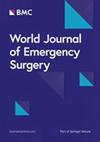接受术后腹膜炎治疗的患者的微生物概况:1999-2019 年的时间趋势
IF 5.8
1区 医学
Q1 EMERGENCY MEDICINE
引用次数: 0
摘要
有报告称,在几种危及生命的感染中,微生物耐药性会发生时间性变化。但是,还没有数据对术后腹膜炎(POP)中的这一问题进行过评估。我们的目的是评估二十年来腹膜炎患者体内耐多药微生物(MDRO)的比例,并分析其对经验性抗生素治疗(EAT)充分性的影响。这项回顾性单中心分析(1999-2019 年)研究了微生物数据随时间推移而发生的变化,包括 MDROs 的出现和所有接受 POP 治疗的重症监护室成人患者的 EAT 适当性。我们对 10 种抗生素的体外活性进行了评估,以确定在有/无 MDRO 分离物的患者中,17 种抗生素治疗方案在最多病例中最适当的 EAT。我们的首要终点是确定 MDRO 的频率及其时间变化。我们的第二个终点是根据药敏试验评估 MDRO 对每位患者 EAT 充分性的影响及其时间变化。在这项分析中,将感染 MDRO 的患者亚组与未感染 MDRO 的患者亚组进行了比较。从 422 名患者身上共培养出 1318 种微生物,其中 188 名患者(45%)携带 MDRO。随着时间的推移,观察到 MDR 肠杆菌的比例不断增加(p = 0.016),其中包括产 ESBL 菌株(p = 0.0013),主要与克雷伯菌属有关(p < 0.001)。305例(73%)患者的EAT达标。当培养出MDRO时,观察到充足率下降[与无MDRO患者相比,p = 0.0001]。在研究期间,接受哌拉西林/他唑巴坦单药治疗或与万古霉素联合治疗以及亚胺培南/西司他丁与万古霉素联合治疗的患者的足量率有所下降(三种情况下的 p 均小于 0.01)。在MDROs患者中,亚胺培南/西司他丁+万古霉素+阿米卡星或环丙沙星的联合治疗达到了最高的充分率(分别为95%和91%),并且随着时间的推移保持不变。我们观察到,在接受持久性有机污染物治疗的患者中,MDRO 的比例很高,而且随着时间的推移,MDR 肠杆菌的比例也在增加。只有碳青霉烯类和万古霉素的抗生素组合才能达到较高的充分率,而在涉及 MDRO 的感染中,哌拉西林/他唑巴坦已不再是 POP EAT 的首选药物。本文章由计算机程序翻译,如有差异,请以英文原文为准。
Microbiological profile of patients treated for postoperative peritonitis: temporal trends 1999–2019
Temporal changes in the microbiological resistance profile have been reported in several life-threatening infections. However, no data have ever assessed this issue in postoperative peritonitis (POP). Our purpose was to assess the rate of multidrug-resistant organisms (MDROs) in POP over a two-decade period and to analyse their influence on the adequacy of empirical antibiotic therapy (EAT). This retrospective monocentric analysis (1999–2019) addressed the changes over time in microbiologic data, including the emergence of MDROs and the adequacy of EAT for all intensive care unit adult patients treated for POP. The in vitro activities of 10 antibiotics were assessed to determine the most adequate EAT in the largest number of cases among 17 antibiotic regimens in patients with/without MDRO isolates. Our primary endpoint was to determine the frequency of MDRO and their temporal changes. Our second endpoint assessed the impact of MDROs on the adequacy of EAT per patient and their temporal changes based on susceptibility testing. In this analysis, the subgroup of patients with MDRO was compared with the subgroup of patients free of MDRO. A total of 1,318 microorganisms were cultured from 422 patients, including 188 (45%) patients harbouring MDROs. The growing proportions of MDR Enterobacterales were observed over time (p = 0.016), including ESBL-producing strains (p = 0.0013), mainly related to Klebsiella spp (p < 0.001). Adequacy of EAT was achieved in 305 (73%) patients. Decreased adequacy rates were observed when MDROs were cultured [p = 0.0001 vs. MDRO-free patients]. Over the study period, decreased adequacy rates were reported for patients receiving piperacillin/tazobactam in monotherapy or combined with vancomycin and imipenem/cilastatin combined with vancomycin (p < 0.01 in the three cases). In patients with MDROs, the combination of imipenem/cilastatin + vancomycin + amikacin or ciprofloxacin reached the highest adequacy rates (95% and 91%, respectively) and remained unchanged over time. We observed high proportions of MDRO in patients treated for POP associated with increasing proportions of MDR Enterobacterales over time. High adequacy rates were only achieved in antibiotic combinations involving carbapenems and vancomycin, while piperacillin/tazobactam is no longer a drug of choice for EAT in POP in infections involving MDRO.
求助全文
通过发布文献求助,成功后即可免费获取论文全文。
去求助
来源期刊

World Journal of Emergency Surgery
EMERGENCY MEDICINE-SURGERY
CiteScore
14.50
自引率
5.00%
发文量
60
审稿时长
10 weeks
期刊介绍:
The World Journal of Emergency Surgery is an open access, peer-reviewed journal covering all facets of clinical and basic research in traumatic and non-traumatic emergency surgery and related fields. Topics include emergency surgery, acute care surgery, trauma surgery, intensive care, trauma management, and resuscitation, among others.
 求助内容:
求助内容: 应助结果提醒方式:
应助结果提醒方式:


